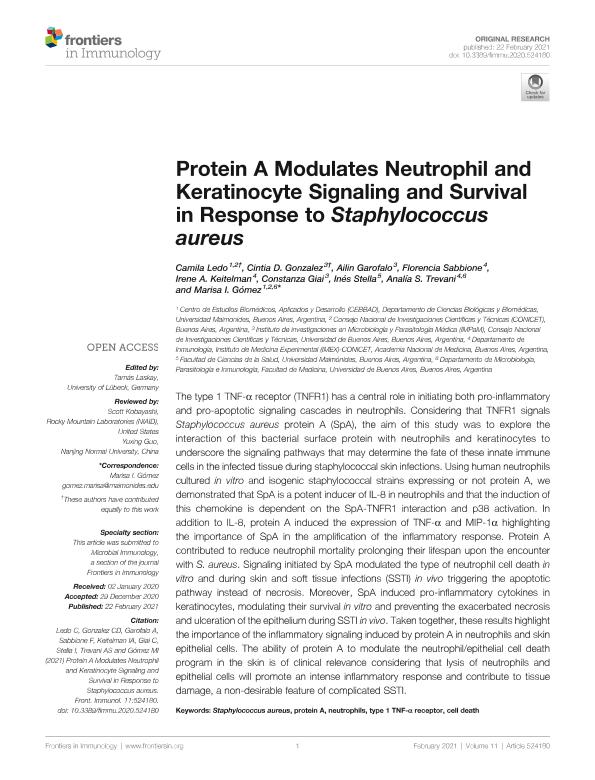Mostrar el registro sencillo del ítem
dc.contributor.author
Ledo, Camila

dc.contributor.author
Gonzalez, Cintia

dc.contributor.author
Garofalo, Ailin Natalia

dc.contributor.author
Sabbione, Florencia

dc.contributor.author
Keitelman, Irene Angélica

dc.contributor.author
Giai, Constanza

dc.contributor.author
Stella, Inés Yolanda

dc.contributor.author
Trevani, Analía Silvina

dc.contributor.author
Gomez, Marisa Ines

dc.date.available
2021-10-22T12:49:26Z
dc.date.issued
2021-02
dc.identifier.citation
Ledo, Camila; Gonzalez, Cintia; Garofalo, Ailin Natalia; Sabbione, Florencia; Keitelman, Irene Angélica; et al.; Protein A Modulates Neutrophil and Keratinocyte Signaling and Survival in Response to Staphylococcus aureus; Frontiers Media; Frontiers in Immunology; 11; 2-2021; 1-15
dc.identifier.issn
1664-3224
dc.identifier.uri
http://hdl.handle.net/11336/144737
dc.description.abstract
The type 1 TNF-α receptor (TNFR1) has a central role in initiating both pro-inflammatory and pro-apoptotic signaling cascades in neutrophils. Considering that TNFR1 signals Staphylococcus aureus protein A (SpA), the aim of this study was to explore the interaction of this bacterial surface protein with neutrophils and keratinocytes to underscore the signaling pathways that may determine the fate of these innate immune cells in the infected tissue during staphylococcal skin infections. Using human neutrophils cultured in vitro and isogenic staphylococcal strains expressing or not protein A, we demonstrated that SpA is a potent inducer of IL-8 in neutrophils and that the induction of this chemokine is dependent on the SpA-TNFR1 interaction and p38 activation. In addition to IL-8, protein A induced the expression of TNF-α and MIP-1α highlighting the importance of SpA in the amplification of the inflammatory response. Protein A contributed to reduce neutrophil mortality prolonging their lifespan upon the encounter with S. aureus. Signaling initiated by SpA modulated the type of neutrophil cell death in vitro and during skin and soft tissue infections (SSTI) in vivo triggering the apoptotic pathway instead of necrosis. Moreover, SpA induced pro-inflammatory cytokines in keratinocytes, modulating their survival in vitro and preventing the exacerbated necrosis and ulceration of the epithelium during SSTI in vivo. Taken together, these results highlight the importance of the inflammatory signaling induced by protein A in neutrophils and skin epithelial cells. The ability of protein A to modulate the neutrophil/epithelial cell death program in the skin is of clinical relevance considering that lysis of neutrophils and epithelial cells will promote an intense inflammatory response and contribute to tissue damage, a non-desirable feature of complicated SSTI.
dc.format
application/pdf
dc.language.iso
eng
dc.publisher
Frontiers Media

dc.rights
info:eu-repo/semantics/openAccess
dc.rights.uri
https://creativecommons.org/licenses/by-nc-sa/2.5/ar/
dc.subject
CELL DEATH
dc.subject
NEUTROPHILS
dc.subject
PROTEIN A
dc.subject
STAPHYLOCOCCUS AUREUS
dc.subject
TYPE 1 TNF-Α RECEPTOR
dc.subject.classification
Enfermedades Infecciosas

dc.subject.classification
Ciencias de la Salud

dc.subject.classification
CIENCIAS MÉDICAS Y DE LA SALUD

dc.title
Protein A Modulates Neutrophil and Keratinocyte Signaling and Survival in Response to Staphylococcus aureus
dc.type
info:eu-repo/semantics/article
dc.type
info:ar-repo/semantics/artículo
dc.type
info:eu-repo/semantics/publishedVersion
dc.date.updated
2021-09-07T18:50:35Z
dc.journal.volume
11
dc.journal.pagination
1-15
dc.journal.pais
Alemania

dc.journal.ciudad
Berlin
dc.description.fil
Fil: Ledo, Camila. Universidad Maimónides. Área de Investigaciones Biomédicas y Biotecnológicas. Centro de Estudios Biomédicos, Biotecnológicos, Ambientales y de Diagnóstico. Departamento de Estudios Biomédicos y Biotecnológicos; Argentina. Consejo Nacional de Investigaciones Científicas y Técnicas; Argentina
dc.description.fil
Fil: Gonzalez, Cintia. Consejo Nacional de Investigaciones Científicas y Técnicas. Oficina de Coordinación Administrativa Houssay. Instituto de Investigaciones en Microbiología y Parasitología Médica. Universidad de Buenos Aires. Facultad de Medicina. Instituto de Investigaciones en Microbiología y Parasitología Médica; Argentina
dc.description.fil
Fil: Garofalo, Ailin Natalia. Consejo Nacional de Investigaciones Científicas y Técnicas. Oficina de Coordinación Administrativa Houssay. Instituto de Investigaciones en Microbiología y Parasitología Médica. Universidad de Buenos Aires. Facultad de Medicina. Instituto de Investigaciones en Microbiología y Parasitología Médica; Argentina
dc.description.fil
Fil: Sabbione, Florencia. Consejo Nacional de Investigaciones Científicas y Técnicas. Instituto de Medicina Experimental. Academia Nacional de Medicina de Buenos Aires. Instituto de Medicina Experimental; Argentina
dc.description.fil
Fil: Keitelman, Irene Angélica. Consejo Nacional de Investigaciones Científicas y Técnicas. Instituto de Medicina Experimental. Academia Nacional de Medicina de Buenos Aires. Instituto de Medicina Experimental; Argentina
dc.description.fil
Fil: Giai, Constanza. Consejo Nacional de Investigaciones Científicas y Técnicas. Oficina de Coordinación Administrativa Houssay. Instituto de Investigaciones en Microbiología y Parasitología Médica. Universidad de Buenos Aires. Facultad de Medicina. Instituto de Investigaciones en Microbiología y Parasitología Médica; Argentina
dc.description.fil
Fil: Stella, Inés Yolanda. Universidad Maimónides; Argentina
dc.description.fil
Fil: Trevani, Analía Silvina. Consejo Nacional de Investigaciones Científicas y Técnicas. Instituto de Medicina Experimental. Academia Nacional de Medicina de Buenos Aires. Instituto de Medicina Experimental; Argentina
dc.description.fil
Fil: Gomez, Marisa Ines. Universidad Maimónides. Área de Investigaciones Biomédicas y Biotecnológicas. Centro de Estudios Biomédicos, Biotecnológicos, Ambientales y de Diagnóstico. Departamento de Estudios Biomédicos y Biotecnológicos; Argentina. Consejo Nacional de Investigaciones Científicas y Técnicas. Oficina de Coordinación Administrativa Houssay. Instituto de Investigaciones en Microbiología y Parasitología Médica. Universidad de Buenos Aires. Facultad de Medicina. Instituto de Investigaciones en Microbiología y Parasitología Médica; Argentina
dc.journal.title
Frontiers in Immunology
dc.relation.alternativeid
info:eu-repo/semantics/altIdentifier/doi/http://dx.doi.org/10.3389/fimmu.2020.524180
dc.relation.alternativeid
info:eu-repo/semantics/altIdentifier/url/https://www.frontiersin.org/articles/10.3389/fimmu.2020.524180/full
Archivos asociados
